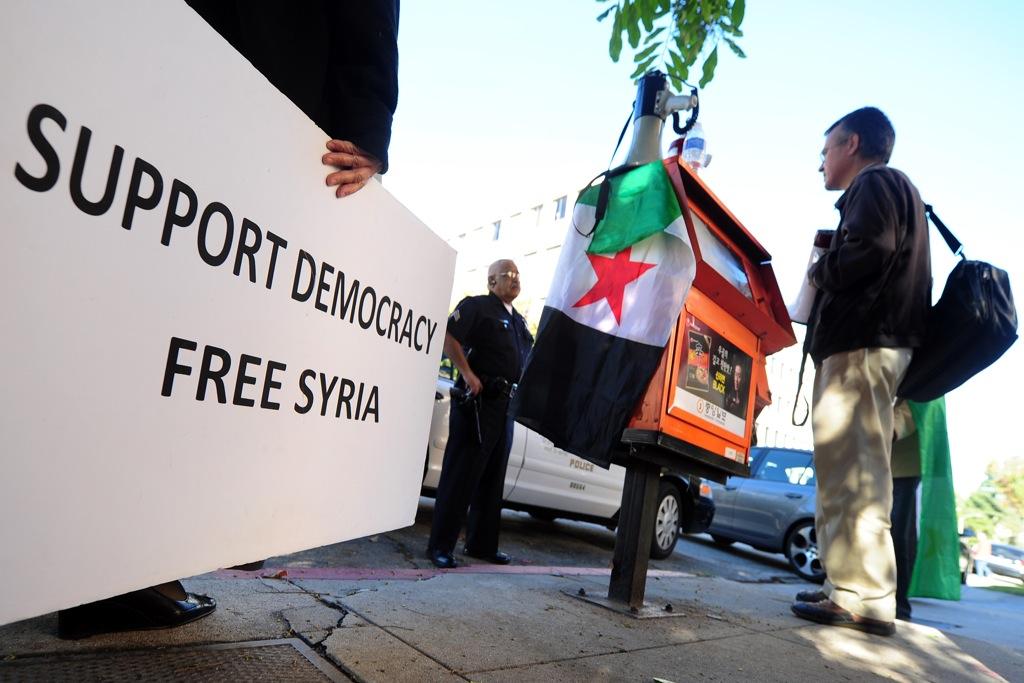Syrian Americans divided over the conflict
A policeman warns protesters to stop using a blowhorn or risk getting arrested for disturbing the peace as Syrian-Americans gathered in front of the Chinese consulate in Los Angeles on December 16, 2011, to protest against the veto by China and Russia the month prior against a UN Security Council resolution condemning the crackdown by Syrian President Bashar al-Assad.
BOSTON — They might be thousands of miles away, but for Syrians living in America, the conflict very much hits home.
Separated from their homeland and their families, Syrian Americans are watching apprehensively as their country descends deeper into a civil war that has so far claimed tens of thousands of lives.
“The Syrian American community follows what is happening, not day by day, but hour by hour, or minute by minute,” said Dr. Mahmoud Khattab, the chairman of the Syrian American Council, the largest Syrian organization in the United States.
While Syrians here find common ground in their desire for an end to the violence, they too are finding themselves divided along the same sectarian lines as their friends and family back home.
More from GlobalPost: Aleppo's Christians arm against Islamists
Syrian Christians are anxious that without the stability long provided by Syrian President Bashar al-Assad, they will be vulnerable to persecution from a majority Muslim population that they say has been radicalized by outside forces.
Many Syrian Muslims here, on the other hand, support the Free Syrian Army and wish to see the overthrow of the Assad, who they say has oppressively ruled the country for decades. They want to see more US support for the Free Syrian Army.
“We understand that Bashar will never ever leave power without force,” Khattab said. “That’s the only language that Bashar al-Assad understands, unfortunately.”
Christians, who comprise about 10 percent of Syria’s total population, see the conflict in a different light.
“Syria is very valuable to me and very precious,” said Osama, a Syrian Christian living in Boston. Concerned about the safety of his family in Damascus and Aleppo, he asked that his last name not be used.
While Osama moved to Boston 25 years ago, he visits friends and family in Syria every year. He said he worries that foreign fighters, aligned with groups like Al Qaeda, have poured into Syria since the start of the uprising, and are meddling in the country’s future.
“There are a lot of jihadists and Islamists, and those people are being paid from places like Qatar, Saudi Arabia, Turkey,” he said.
“I’ve seen many countries interfere with Syria and they don’t have [the] right to do that,” said Michael, another Syrian Christian who also asked that his last name not be used.
More from GlobalPost: Arab Spring no more
The conflict, which began in March 2011, started as peaceful demonstration for political reform. But after the Assad regime viciously cracked down on protesters, the movement transformed into an armed uprising.
“I don’t support the Assad regime,” Osama said. “But at the end of the day, we lived with Assad for 40 years. We were safe. No one burned our churches. The jihadists and the Islamists, they burned our churches and they killed our people.”
For the country’s majority population of Sunni Muslims, however, it is the Assad family that is guilty of sectarian repression. The Assad family belongs to the minority Allawite sect of Shiite Islam, and has drawn on fellow Allawites for most of the top positions in the country.
The government of Hafez al-Assad, the current president’s father, ordered a massacre of Sunni Muslims after an uprising erupted in 1981 in the restive city of Homs. The memory of the assault remains fresh on the minds of many inside and outside the country.
“There are millions of Syrians asking for freedom, asking for democracy,” Khattab said. “And Assad chose to slaughter his people in order to stay in power.”
Video from GlobalPost: The fight for Aleppo (GRAPHIC)
As part of a campaign to help Syrians back home, organizations like the Syrian American Council, United for a Free Syria and the Syrian Emergency Task Force advocate for US support of the Free Syrian Army.
“We the Syrian American community are frustrated with the American response,” Khattab said. “We are looking for our president and our administration to take real action.”
Though they are against the use of US ground troops, Khattab said many Syrians in the United States support the establishment of no-fly zones by the United States or NATO.
Syrian Christians, however, are wary of such intervention.
“I don’t know what Mr. Obama would do here if somebody came to fight in his country,” Michael said. “He will say ‘OK, OK, take it,’ and he will leave? No, he will bring the army and kill them also.”
We want to hear your feedback so we can keep improving our website, theworld.org. Please fill out this quick survey and let us know your thoughts (your answers will be anonymous). Thanks for your time!
